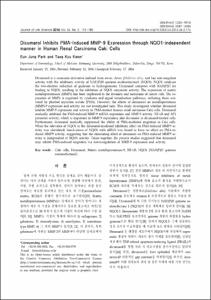인간 신장암 Caki세포에서 dicumarol에 의한 PMA 매개 matrix metalloproteinase-9의 발현 억제 효과
- Keimyung Author(s)
- Kwon, Taeg Kyu
- Department
- Dept. of Immunology (면역학)
- Journal Title
- 생명과학회지
- Issued Date
- 2016
- Volume
- 26
- Issue
- 2
- Keyword
- Caki cells; Dicumarol; Matrix metalloproteinase-9; NF-κB; NQO1 (NAD(P)H quinone oxidoreductase1)
- Abstract
- Dicumarol is a coumarin derivative isolated from sweet clover (Melilotus alba), and has anti-coagulant
activity with the inhibitory activity of NAD(P)H quinone oxidoreductase1 (NQO1). NQO1 catalyzes
the two-electron reduction of quinones to hydroquinones. Dicumarol competes with NAD(P)H for
binding to NQO1, resulting in the inhibition of NQO1 enzymatic activity. The expression of matrix
metalloproteinases (MMPs) has been implicated in the invasion and metastasis of cancer cells. The expression
of MMPs is regulated by cytokines and signal transduction pathways, including those activated
by phorbol myristate acetate (PMA). However, the effects of dicumarol on metalloproteinase
(MMP)-9 expression and activity are not investigated here. This study investigated whether dicumarol
inhibits MMP-9 expression and activity in PMA-treated human renal carcinoma Caki cells. Dicumarol
markedly inhibited the PMA-induced MMP-9 mRNA expression and MMP-9 activity. NF-κB and AP1
promoter activity, which is important in MMP-9 expression, also decreased in dicumarol-treated cells.
Furthermore, dicumarol markedly suppressed the ability of PMA-mediated migration in Caki cells.
When the relevance of NQO1 in the dicumarol-mediated inhibitory effect on PMA-induced MMP9 activity
was elucidated, knock-down of NQO1 with siRNA was found to have no effect on PMA-induced
MMP9 activity, suggesting that the stimulating effect of dicumarol on PMA-induced MMP9 activity
is independent of NQO1 activity. Taken together, the present studies suggested that dicumarol
may inhibit PMA-induced migration via down-regulation of MMP-9 expression and activity.
Dicumarol는 전동싸리 식물에서 추출한 coumarin 유도체로 vitamin K 의존적으로 항응고 작용를 한다. 그러
나, dicumarol에 의한 MMP-9의 발현 및 활성화 조절에 대한 연구는 수행되지 않았다. 본 연구에서 dicumarol이
인간 신장암 Caki세포에서 PMA 매개의 MMP-9의 발현과 활성화를 조절 할 수 있는지 확인하였다. Dicumarol는
PMA유도 MMP-9의 활성을 억제하였고, MMP-9의 mRNA RT-PCR 및 promoter assay를 통하여 전사단계에서
조절됨을 확인하였다. Dicumarol에 의한 MMP-9 발현 조절에 NF-κB와 AP1 전사인자의 전사 활성 저해에 의하여
야기됨을 확인하였다. NQO1 siRNA를 이용한 knock-down 실험에서 dicumarol이 PMA유도의 MMP-9 활성 억
제에 NQO1의 관련성을 확인 할 수 없었다. Dicumarol는 PMA에 의한 세포이동 및 침윤을 억제하였는데, 이러한
현상은 MMP-9의 발현 및 활성을 조절함으로써 일어날 수 있음을 확인하였다.
- Alternative Title
- Dicumarol Inhibits PMA-Induced MMP-9 Expression through NQO1-independent
manner in Human Renal Carcinoma Caki Cells
- Keimyung Author(s)(Kor)
- 권택규
- Publisher
- School of Medicine
- Citation
- 박은정 and 권택규. (2016). 인간 신장암 Caki세포에서 dicumarol에 의한 PMA 매개 matrix metalloproteinase-9의 발현 억제 효과. 생명과학회지, 26(2), 174–180. doi: 10.5352/JLS.2016.26.2.174
- Type
- Article
- ISSN
- 1225-9918
- Appears in Collections:
- 1. School of Medicine (의과대학) > Dept. of Immunology (면역학)
- 파일 목록
-
-
Download
 oak-2016-0072.pdf
기타 데이터 / 1.25 MB / Adobe PDF
oak-2016-0072.pdf
기타 데이터 / 1.25 MB / Adobe PDF
-
Items in Repository are protected by copyright, with all rights reserved, unless otherwise indicated.